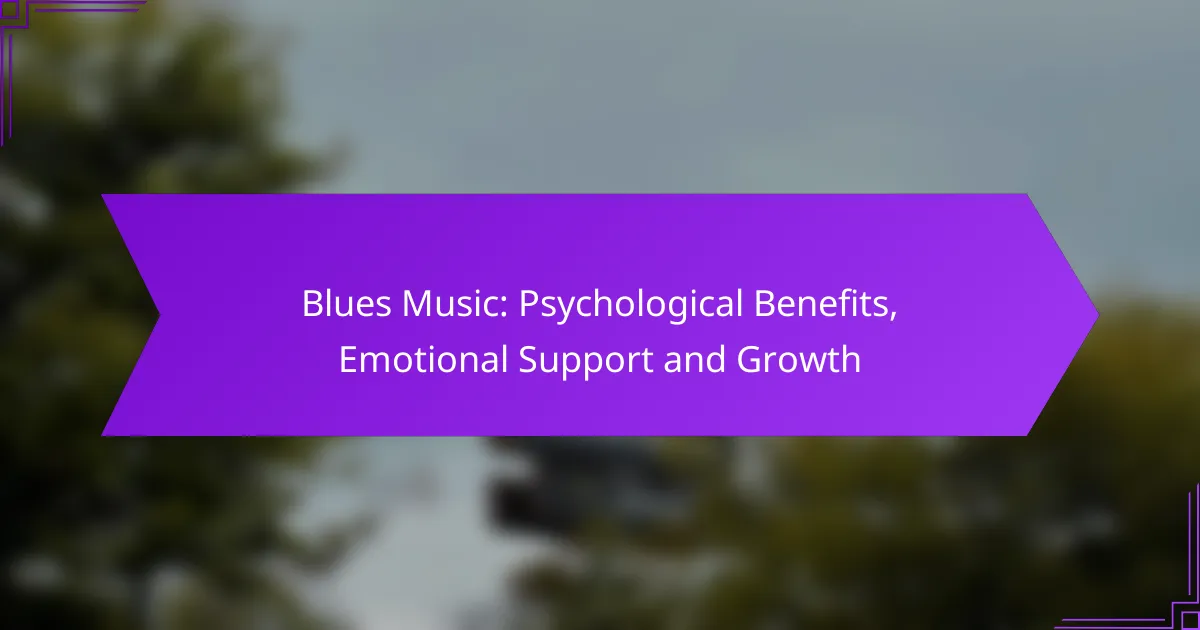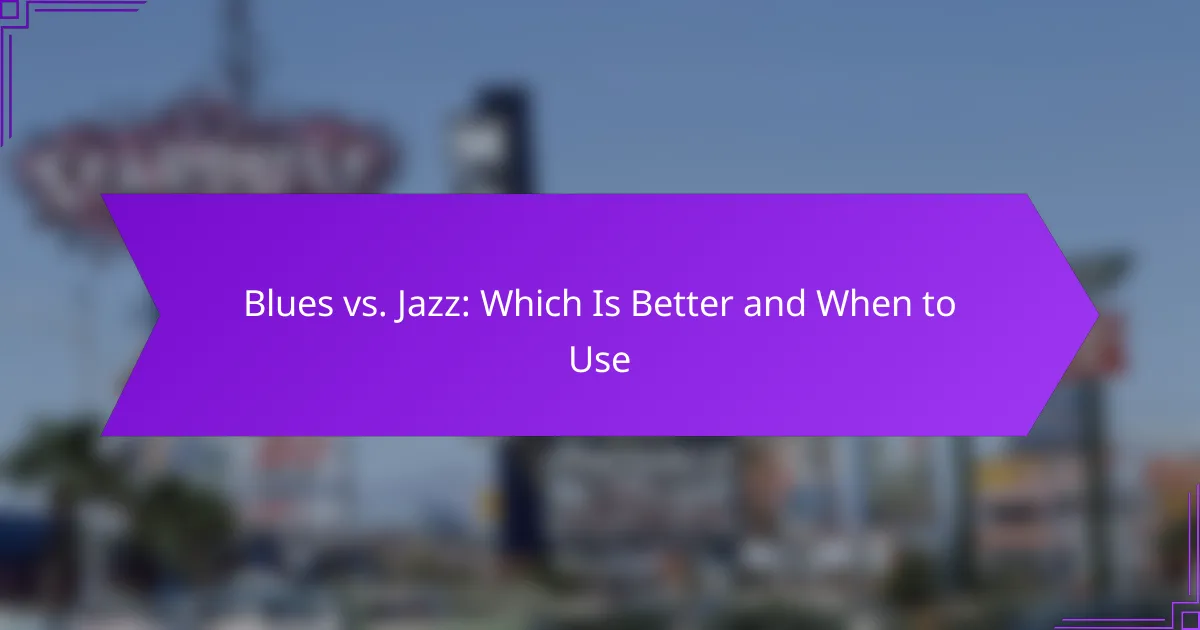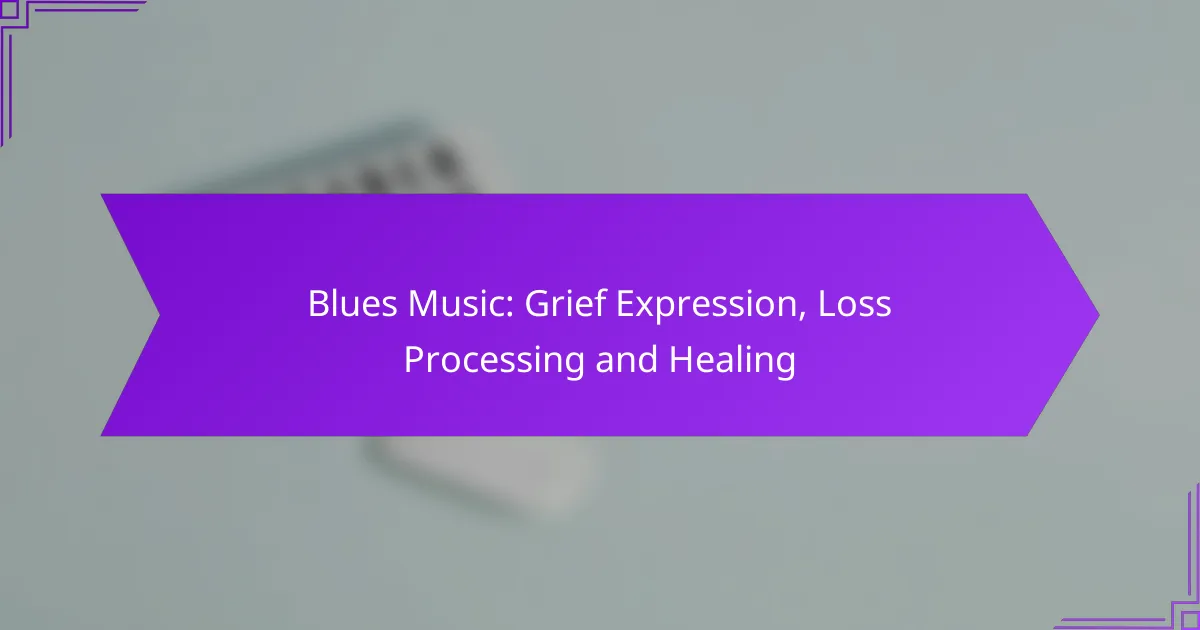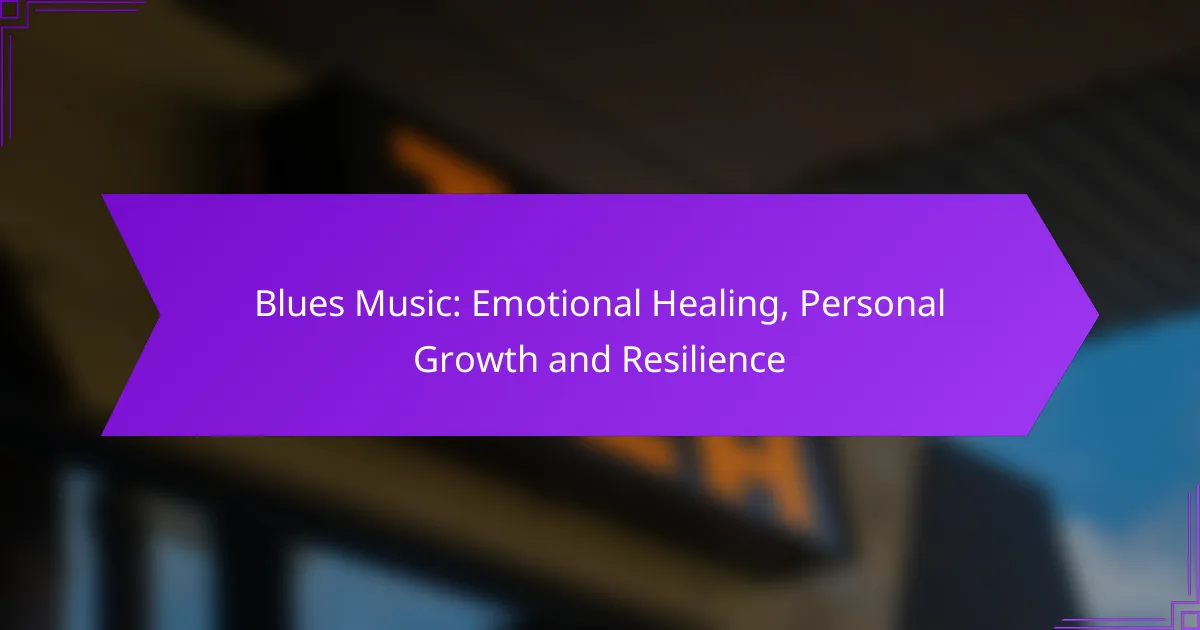Blues music serves as a powerful tool for psychological healing, offering listeners a means to connect with their emotions and enhance their mental well-being. By expressing themes of sorrow, resilience, and hope, it provides emotional support and fosters personal growth through introspection and self-awareness. The rich storytelling and emotive melodies of blues create a unique space for individuals to process their experiences and find solace in shared struggles.
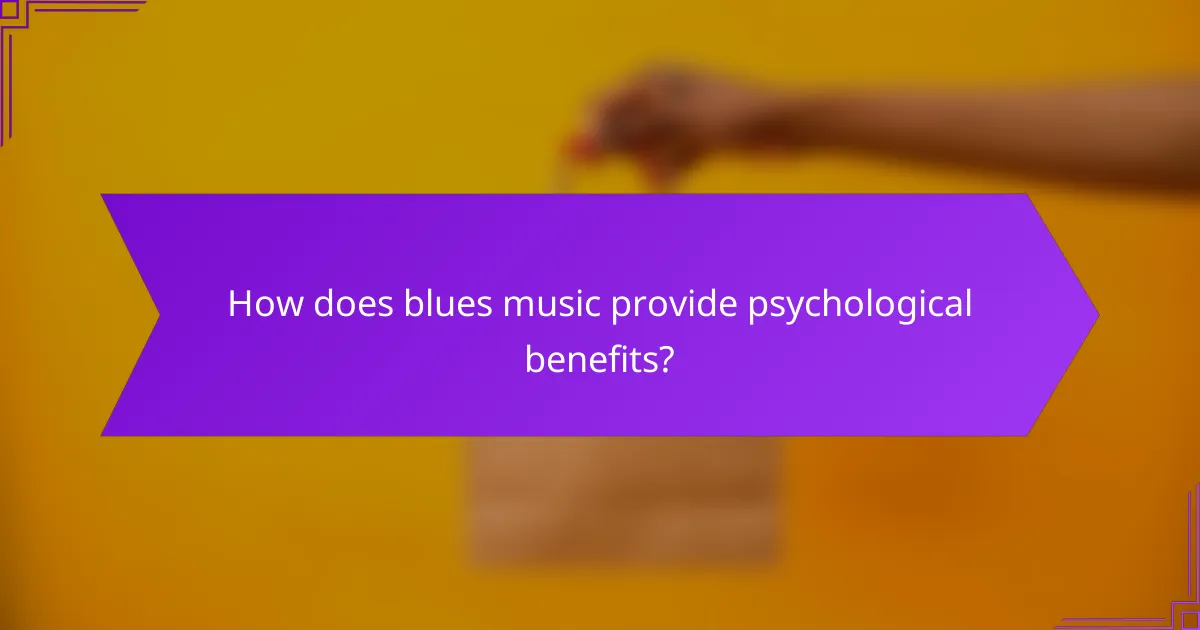
How does blues music provide psychological benefits?
Blues music offers significant psychological benefits by promoting emotional healing and enhancing mental well-being. Its expressive nature allows listeners to connect with their feelings, leading to improved emotional health and resilience.
Reduces stress and anxiety
Listening to blues music can effectively reduce stress and anxiety levels. The slow tempo and soothing melodies create a calming atmosphere, which can help lower heart rates and promote relaxation.
Engaging with blues music, whether through listening or playing an instrument, can serve as a form of emotional release. This process allows individuals to process their feelings, leading to a reduction in anxiety symptoms.
Enhances mood and emotional expression
Blues music enhances mood by providing a platform for emotional expression. The genre often reflects themes of struggle and resilience, allowing listeners to relate their own experiences and feel understood.
Participating in blues music, whether through singing or playing, can also boost mood by fostering a sense of community and connection. This social aspect can further enhance emotional well-being and provide support during difficult times.
Improves cognitive function
Engaging with blues music can improve cognitive function by stimulating various brain areas involved in memory and emotion. The complexity of blues rhythms and lyrics encourages active listening and mental engagement.
Regular exposure to music, including blues, has been linked to enhanced problem-solving skills and creativity. This cognitive boost can be particularly beneficial for individuals seeking to improve their mental agility and overall brain health.
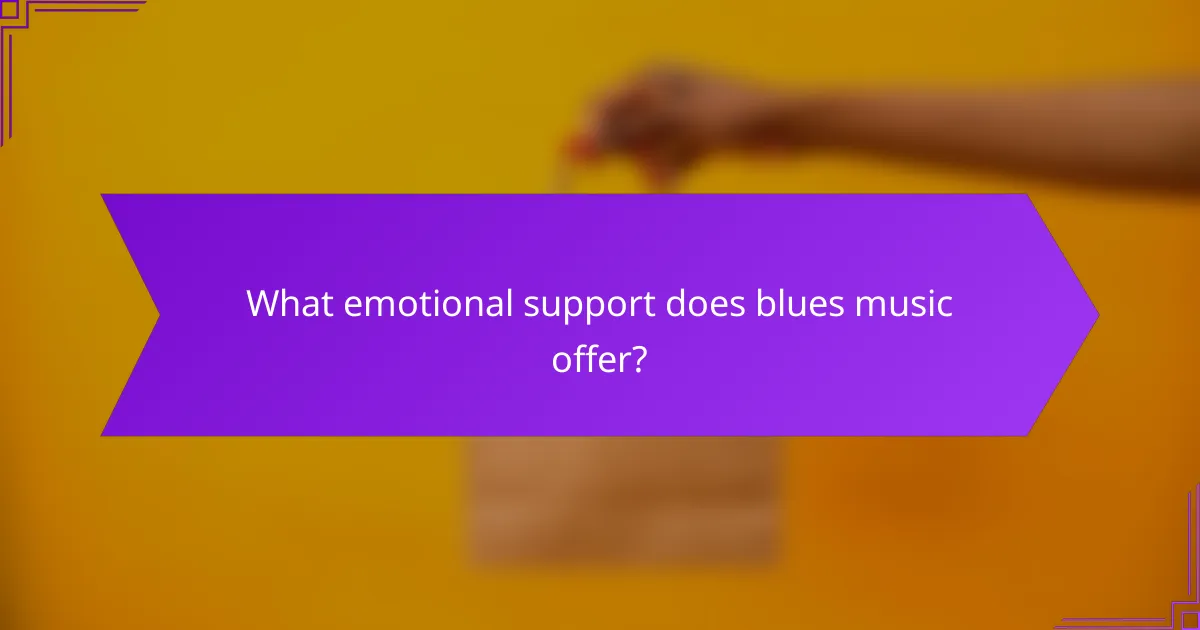
What emotional support does blues music offer?
Blues music provides emotional support by allowing listeners to connect with their feelings and experiences. It often expresses themes of sorrow, resilience, and hope, helping individuals process their emotions and find solace in shared struggles.
Fosters connection and community
Blues music creates a sense of belonging by bringing people together through shared experiences and emotions. Live performances and jam sessions often cultivate a communal atmosphere where individuals can bond over their love for the genre.
Participating in blues music events, whether as a listener or performer, can enhance social connections. Engaging with others who appreciate the genre fosters friendships and networks, enriching personal lives and creating supportive communities.
Encourages emotional healing
Listening to blues music can facilitate emotional healing by providing an outlet for expressing pain and sorrow. The raw, honest lyrics often resonate with listeners, allowing them to confront their feelings rather than suppress them.
For those dealing with grief or hardship, blues music can serve as a therapeutic tool. It encourages reflection and understanding, helping individuals navigate their emotions and find a path toward recovery. Incorporating blues music into daily routines can be a simple yet effective strategy for emotional well-being.
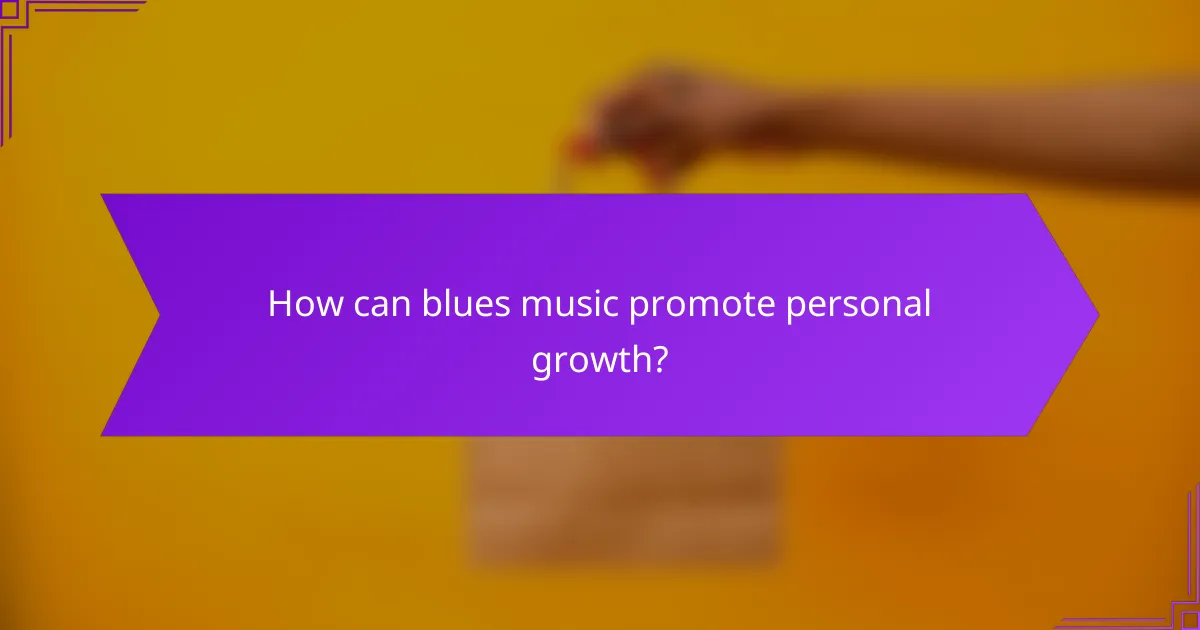
How can blues music promote personal growth?
Blues music can significantly promote personal growth by providing a unique avenue for emotional expression and introspection. Through its rich storytelling and emotive melodies, individuals can explore their feelings and experiences, leading to greater self-awareness and personal development.
Facilitates self-reflection
Listening to blues music encourages self-reflection by allowing individuals to connect with the themes of struggle, heartache, and resilience present in the lyrics. This connection can prompt listeners to examine their own life experiences and emotions, fostering a deeper understanding of themselves.
Engaging with blues can be a meditative experience. Setting aside time to listen to a few tracks while journaling or contemplating personal challenges can enhance this reflective process. Aim for sessions of about 30 minutes to fully immerse in the music and your thoughts.
Inspires creativity and resilience
Blues music inspires creativity by showcasing how artists transform pain into art. This process can motivate listeners to channel their own struggles into creative outlets, whether through writing, painting, or other forms of expression. The improvisational nature of blues can also encourage experimentation in one’s creative pursuits.
Moreover, the themes of overcoming adversity in blues music can instill a sense of resilience. Hearing stories of triumph over hardship can empower individuals to face their own challenges with a renewed perspective. Consider creating a playlist of blues songs that resonate with your experiences to serve as a source of inspiration during tough times.

What are the key elements of blues music?
The key elements of blues music include its distinctive instrumentation, rhythmic patterns, and lyrical themes that often reflect deep emotional experiences. These components work together to create a unique sound that resonates with listeners, offering both emotional support and a means of expression.
Instrumentation and rhythm
Blues music typically features a combination of instruments such as the guitar, harmonica, piano, and bass. The rhythm is often characterized by a steady, repetitive pattern that allows for improvisation, creating a laid-back yet engaging feel.
Commonly, the 12-bar blues structure is used, which consists of three lines of lyrics with a specific chord progression. This format provides a framework that musicians can easily adapt while maintaining the genre’s signature sound.
Lyrical themes and storytelling
The lyrics in blues music often delve into themes of hardship, love, and resilience, reflecting the struggles and triumphs of everyday life. Storytelling is a crucial aspect, with artists conveying personal experiences and emotions that resonate with their audience.
Many blues songs employ metaphor and vivid imagery to evoke feelings, allowing listeners to connect on a deeper level. This narrative style not only entertains but also serves as a form of emotional catharsis for both the artist and the audience.

How can I incorporate blues music into my life for emotional support?
Incorporating blues music into your life can provide significant emotional support by enhancing your mood and offering a sense of connection. Engaging with this genre through live performances or personalized playlists can help you process emotions and foster personal growth.
Attend live performances
Experiencing blues music live can create a powerful emotional connection. Attending concerts or local jam sessions allows you to immerse yourself in the music and feel the energy of the crowd, which can be uplifting and cathartic.
Look for venues in your area that host blues nights or festivals. Many cities have dedicated blues clubs or community events where you can enjoy live performances. Engaging with fellow fans can also enhance your emotional experience and provide a sense of belonging.
Create personalized playlists
Curating your own blues playlists can be a therapeutic way to connect with the music. Select songs that resonate with your feelings or experiences, allowing you to reflect on your emotions while enjoying the soothing melodies and heartfelt lyrics.
Consider organizing your playlists by mood or theme, such as “uplifting blues” for when you need motivation or “reflective blues” for quieter moments. Streaming platforms often allow you to create and share playlists, making it easy to explore new artists and styles within the blues genre.
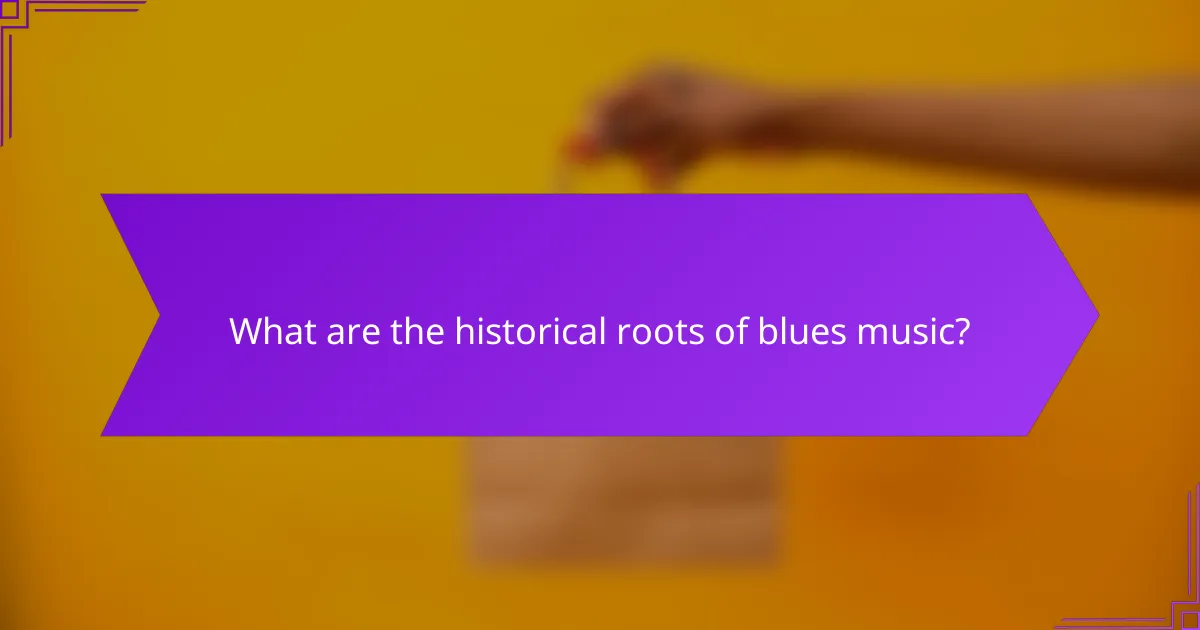
What are the historical roots of blues music?
The historical roots of blues music trace back to the late 19th and early 20th centuries, primarily within African American communities in the southern United States. This genre emerged as a form of expression, reflecting the struggles, joys, and cultural experiences of its creators.
Origins in African American communities
Blues music originated in the Deep South, particularly in states like Mississippi, Louisiana, and Alabama, where African American populations were significant. It developed from a blend of African musical traditions, folk songs, and the experiences of enslaved people. The genre served as a means of storytelling, allowing musicians to convey their emotions and life experiences.
As blues spread, it became a vital part of social gatherings, often performed at juke joints and house parties. The communal aspect of blues music fostered a sense of belonging and identity among African Americans, making it a cornerstone of their cultural heritage.
Influence of spirituals and work songs
Spirituals and work songs significantly influenced the development of blues music. Spirituals, rooted in religious expression, often featured themes of hope and resilience, while work songs provided a rhythmic backdrop for labor, helping to coordinate tasks and alleviate the hardships of daily life. Both forms emphasized call-and-response patterns, which became a hallmark of blues music.
The emotional depth found in spirituals and the rhythmic structure of work songs merged to create a unique sound that characterized early blues. This fusion allowed musicians to articulate their struggles and aspirations, laying the groundwork for future genres such as jazz and rock ‘n’ roll.
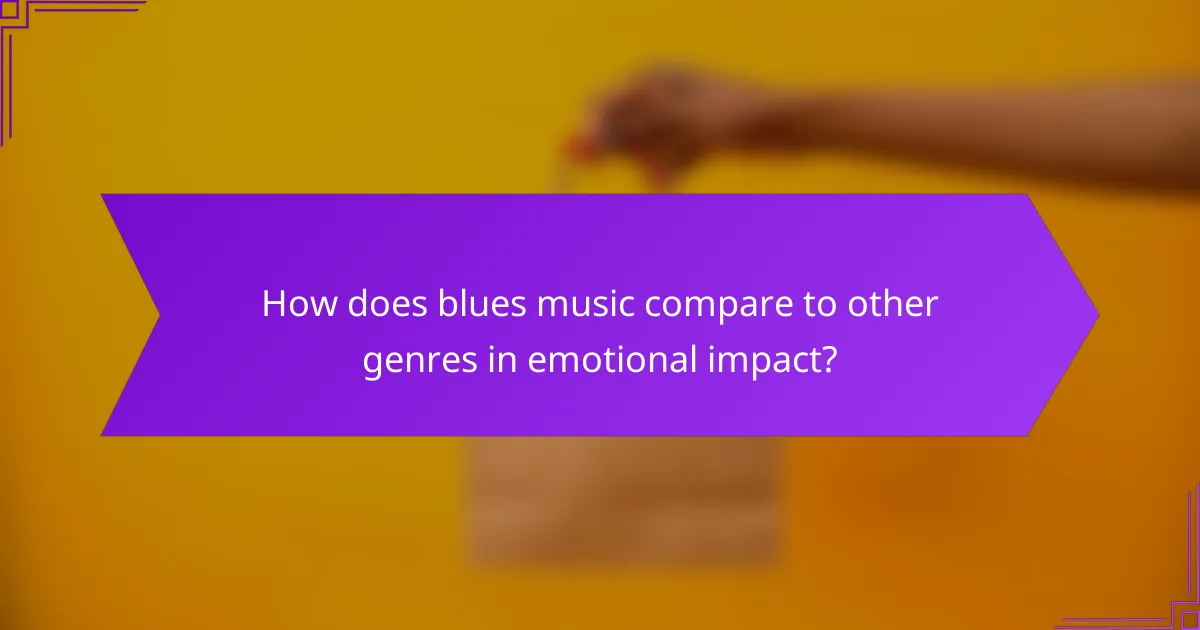
How does blues music compare to other genres in emotional impact?
Blues music often evokes a deeper emotional response compared to many other genres due to its unique combination of lyrical content and musical structure. While genres like pop or rock may focus on upbeat themes, blues delves into personal struggles, heartache, and resilience, creating a profound connection with listeners.
Unique lyrical depth
The lyrics in blues music are often rich with storytelling, reflecting personal experiences of pain, love, and hardship. This depth allows listeners to relate to the emotions conveyed, often leading to catharsis and self-reflection. For example, songs may explore themes of loss or longing, resonating with individuals who have faced similar challenges.
In contrast to genres that prioritize catchy hooks, blues lyrics often prioritize authenticity and emotional honesty. This focus on genuine expression can foster a sense of community among listeners, as they share in the universal human experience of struggle and triumph.
Distinctive improvisational style
The improvisational nature of blues music adds another layer to its emotional impact. Musicians often express their feelings spontaneously through solos and variations, allowing for a unique performance each time. This unpredictability can evoke a sense of excitement and connection, as listeners feel the raw emotions in real-time.
Unlike more structured genres, the freedom in blues improvisation encourages musicians to explore their feelings and convey them through their instruments. This can create a powerful atmosphere where both the performer and the audience engage in a shared emotional journey, enhancing the overall experience of the music.
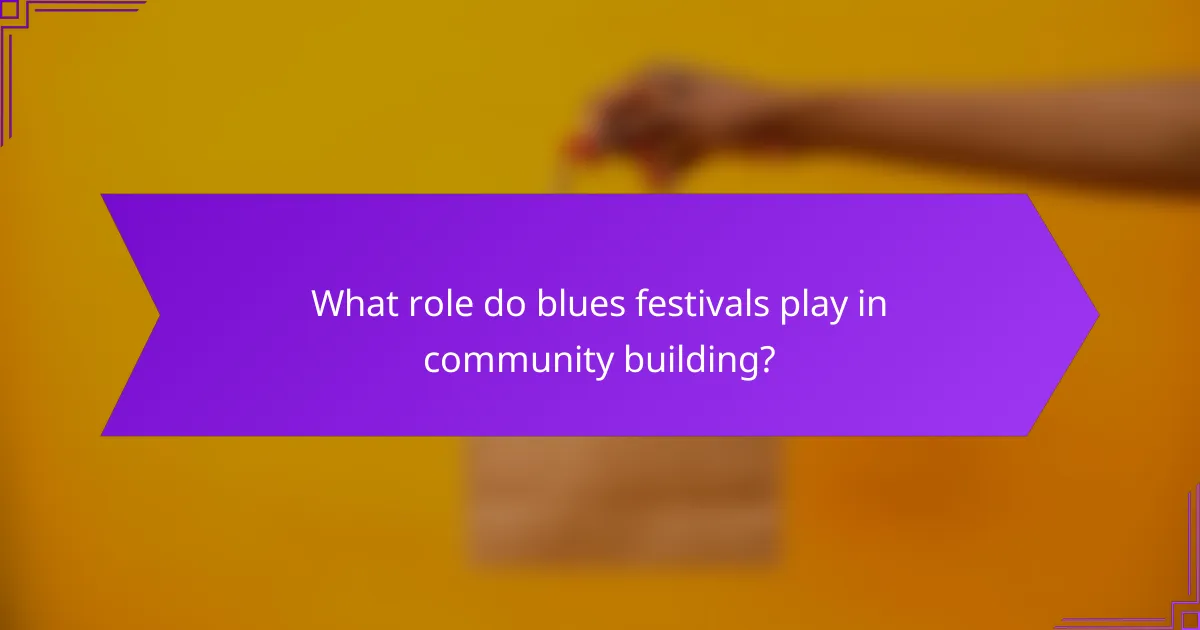
What role do blues festivals play in community building?
Blues festivals serve as vital platforms for community building by bringing together diverse groups of people who share a passion for music. These events foster social connections, promote local culture, and support economic growth within the community.
Fostering Social Connections
Blues festivals create opportunities for attendees to meet and interact, forming friendships and networks. By gathering individuals from various backgrounds, these festivals encourage dialogue and collaboration, strengthening community ties.
Promoting Local Culture
These festivals highlight local artists and traditions, showcasing the unique cultural heritage of the area. By featuring regional musicians and food vendors, blues festivals help preserve and promote local customs, making them integral to community identity.
Supporting Economic Growth
Blues festivals can significantly boost local economies by attracting visitors who spend money on accommodations, food, and merchandise. This influx of tourism can lead to job creation and increased revenue for local businesses, contributing to overall economic vitality.
